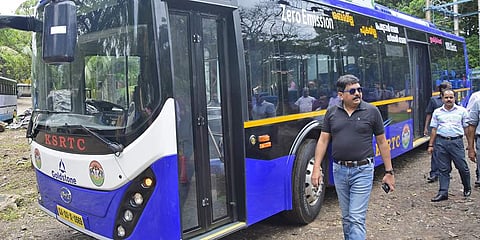

THIRUVANANTHAPURAM: Even as the government is going ahead with the proposal to launch more electric buses across the state, KSRTC officers and the trade unions are doubtful whether the e-buses will fetch the expected revenue.
As per the wet lease, the e-buses launched by the KSRTC will generate a profit to the corporation only if it covers more than 400 km in a day. As the government plans to ply all-electric buses in the capital city by 2020, the MD has informed if the e-buses become an extra burden to the corporation, then the government will have to compensate the loss.
Such a decision was taken in a recent conference convened by the KSRTC MD with the Transport Democratic Federation (TDF). Ten e-buses are now plying on long routes between Thiruvananthapuram and Kochi. The government in its 2019-20 budget declared by 2020 all public transport vehicles in the capital city will be converted into e-vehicles.
The state-owned KSRTC launched 10 zero-emission and noiseless air-conditioned battery electric vehicles (BEVs) in its first step towards green mobility. In an effort to address its financial burden, the corporation planned to expand its services by introducing new fleets on wet lease.
As per the wet lease contract, only if an e-bus covers a distance of 400 km will it be able to achieve the expected target revenue. In the environmental-friendly 31-seater bus there is no separate space to accommodate the conductor.
The KSRTC will have to pay Rs 46.20 per km to the company in a day for operating up to 400 km. Even if the vehicle is not operating the corporation is bound to pay the lease amount as per the agreement.
Another issue that arises due to the e-bus is to ply the vehicle in the capital city the first thing required is a charging point at various city depots. But the drawback here is the charging station can be established only in those city depots which have a capacity to hold a 11 KV electric line.
“Even if in a day an e-bus operates with full passengers from the capital city to Kochi, the corporation will be able to make a ticket collection of R22,400. After paying the lease amount of Rs 21,000 to the owner company, the corporation could only make a collection of Rs 1,400 in a day. This amount will be achieved only if the bus operates with full seating passenger. But now only 10-15 passengers are seen plying in the bus,” said R Sasidharan, working president of the INTUC-affiliated union.
During a meeting the MD also informed us that the corporation has informed the government that if there is any loss caused by operating the government’s proposed new e-vehicles in the coming years, then they themselves will have to compensate the loss, said Sasidharan.
Woes galore
The KSRTC will have to pay I46.20 per km to the leasing company in a day for operating up to 400 km
Even if the vehicle is not operating the corporation is bound to pay the lease amount as per the agreement
Charging stations for the e-buses can be established only in those city depots which have a capacity to hold a 11 KV electric line
The MD said if the e-buses become an extra burden, then government will have to compensate the loss